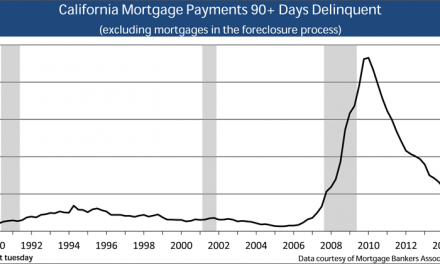Seller carrybacks, also called carryback financing, trust deed notes, lease-option sales (purchase-lease-options), land sales contracts and contracts for deed, sometimes even structured as title-holding trust agreements, subsist on low buyer purchasing power and high mortgage rates. Recent housing conditions beckon their return, with a wink to due-on clauses, property reassessments, sales/income taxes, escrowing and impounds as trust funds.
For example, a seller negotiates carryback financing structured as a land sales contract, classified as a “masked security device” and used as an alternative to trust deed note financing. Here, the seller retains title to the property when they deliver possession to the buyer on signing the land sales contract. Later, when the buyer has satisfied contract conditions — most often the timely payment of installments and specified rehabilitation of the property – the seller transfers title to the buyer. [Calif. Civil Code §2985; see RPI Form 163]
However, the buyer may voluntarily pay off the total amount owed under the contract one year after the date they entered into the land sales contract. [CC §2985.6]
Land sales contracts as “masked security devices” are not required to be recorded in most states, including California — leaving a gaping hole in seller accountability under the masked arrangement.
By contrast, sellers properly negotiate carryback financing structured as a grant deed, a promissory note and trust deed. The note evidences the amount yet to be paid by the buyer, and the trust deed places a lien on the property concurrently conveyed to the buyer on closing. The grant deed and trust deed are recorded with the county recorder at the time of closing and transfer of possession to the buyer. [See RPI Form 421 and 450]
Thus, the grant deed, the note and trust deed fully document the carryback financing agreements for both the buyer and the seller — a significant contrast to the capricious nature of unrecorded land sales contract situations and sellers.
The number of seller carrybacks negotiated across the U.S. increased in recent years, following the mass sale of dilapidated homes foreclosed upon in the housing crisis, according to the New York Times. Land sales contracts are currently most popular in Midwestern states and target underprivileged and minority buyers.
The federal Consumer Financial Protection Bureau (CFPB) caught a whiff of the rising national trend and began sniffing out potential seller carryback abuses. However, the CFPB’s intentions are unknown as it has not yet declared a course of action it will take to protect consumers.
Benefits and risks of seller carrybacks
Seller carrybacks allow buyers with credit unfit for institutional mortgage lending to reenter the housing market after being expunged by foreclosure during the housing crisis. These buyers often lack the personal savings needed for a down payment and the credit history needed to obtain a mortgage; seller carrybacks require neither. In fact, nonprofit housing organizations across the U.S. use seller carrybacks to restore buyers to homeownership more quickly.
However, seller carrybacks of the land sales contract variety are more often designed to benefit the seller, not the buyer (one aspect of the widening class distinctions between rentiers and debtors in the country today).
Since seller carrybacks aren’t required to be recorded, they provide opportunity for wily sellers to abuse their apparent simplicity and conduct a pseudo-mortgage business for consumers beneath the federal CFPB radar.
Seller carrybacks also frequently require more of the buyer than just installment payments. Some buyers have to rehabilitate severely dilapidated homes with what little expendable income they earn. When buyers don’t succeed in completing repairs by the date required, sellers promptly act against them — often by eviction, which embarrassed buyers don’t contest for lack of acumen and financial ability to retain an attorney.
Accordingly, seller carrybacks are popular among flippers on a resale. Flippers use land sales contracts to require buyers to make repairs and eliminate obsolescence on homes, then force the buyers out to turn a profit on a resale once the home’s value increases due to the buyer’s improvements.
A seller under a land sales contract might choose to further encumber the property due to their own financial necessity. In California, the seller needs the buyer’s consent to lawfully encumber the property sold under a land sales contract or other masked security device. Even then, the encumbrance may not exceed the existing installments or total specified in the land sales contract. [CC §2985.2]
However, even with the buyer’s consent and within the contractual parameters, an encumbrance on the property makes it more difficult for the buyer to eventually obtain title from the seller. Many buyers who enter into seller carrybacks do so because they can’t get a mortgage directly; formally assuming the seller’s mortgage on the contracted property with the lender is equally impossible.
Many contracts also include arbitration provisions which buyers sign — unwittingly surrendering their rights to judicial protection in a dispute, a condition abhorred by the CFPB.
Seller carrybacks in California
In California, sellers, buyers and their agents deliberately complicate the use of masked security device arrangements. Some seller carrybacks are structured like lease-option sales, some as land sales contracts; or they incorporate aspects of both types of agreements on a default — making it difficult for courts to create blanket resolutions which apply to these otherwise real estate mortgage debt arrangements.
For example, the California Supreme Court ruled in 1985 that a buyer who pays a substantial portion of the purchase price agreed to in a land sales contract has a right of redemption on default to pay off the debt and obtain clear title, treating the contractual terms as a mortgage relationship. [Petersen v. Hartell (1985) 40 C3d 102]
Contrarily, a recent case from a California appellate court concluded that a buyer who defaults on installment payments under a land sales contract containing a leasehold conversion provision on default may be evicted by the seller through an unlawful detainer (UD) action, the seller carryback in effect functioning as a lease agreement on default. Thus, leasehold conversion provision negates the right of redemption on default under contract law, but not mortgage law. [Taylor v. Nu Digital Marketing (2016) 245 CA4th 283]
Although the idea of circumventing mortgages and skipping the long, arduous saving process to restore their credit and reenter homeownership sounds appealing, buyers need to know the additional layer of risk imposed by entering into land sales contracts with sellers.
The takeaway from these cases is simple: using an unreliable and unrecorded contract with high risk of loss, particularly of the right to cure a default or redeem the property title on a full payoff, is not the way to structure seller carryback financing. When carryback financing is the only option for buyers with difficulty obtaining institutional mortgage financing, agents need to advise them to negotiate with the seller for title by grant deed, a note and trust deed, a combination escrowed with title insurance in which title is held by the buyer, not the seller. [See RPI Form 150]
However, merely informing buyers of risks doesn’t stop sellers from taking advantage of buyers. The CFPB needs to require seller carryback financing to be recorded at closing and transfer of possession, with title in the name of the buyer. When seller carrybacks are effectively regulated, they reintroduce non-creditworthy buyers into the elusive housing market with the same degree of ownership security as on an acquisition funded by lender financing – a home at last.



















Great article. I am glad someone is addressing it. I don’t see the security risk here though. Just because something is not regulated does not make it inherently more risky. We have survived for an awful long time without extensive government intrusion into seller carry backs, and i am not seeing the current extensive oversight being all that helpful in providing more security. Only more hoops, limiting consumers options, and government driven lending requirements rather than consumer driven.
thanks for writing it!